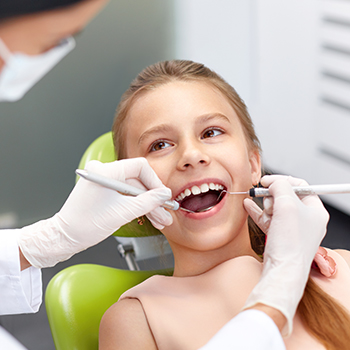Common Dental Questions
According to the American Academy of Pediatric Dentistry has recommended that children have their first visit to the dentist by the age of one. The earlier you can get your children used to the dentist’s office, the more comfortable they’ll feel and the less dental anxiety they may experience. Additionally, addressing dental problems early on can help your child build a foundation for good oral hygiene and maintain a healthy, beautiful smile to last a lifetime!
Many people assume that baby teeth aren’t that important because children are just going to lose them eventually anyway. However, baby teeth are very important to your child’s oral health now and in the future. Below are a few of the reasons why baby teeth are important:
- Baby teeth can help your child to eat and chew properly
- Baby teeth, as long as they’re properly developed, can help your child with speech development
- Baby teeth serve as space-savers for permanent teeth
- A healthy and beautiful smile will boost your child’s self-confidence
Many people only floss occasionally, but it’s so important to make sure you’re flossing every single day. This is because flossing is the only way to clean in between the teeth where your toothbrush can’t reach! We see many dental cavities occurring between the teeth because of patients neglecting to floss. Flossing is also the number one way to combat gum disease!
You don’t need to use toothpaste for your child until his or her teeth begin to erupt. Initially, you should be brushing your baby’s teeth with a soft-bristled brush and fluoride-free toothpaste. Once your child is over the age of two, we recommend using a pea-sized amount of fluoride toothpaste to brush your child’s teeth. When he reaches the age of 4, you may want to allow him to brush his own teeth, with supervision.
The number one reason for chronic bad breath is bacteria buildup in the mouth. If your kids aren’t brushing or flossing properly or often enough, they may suffer from bad breath. Other possible causes include the following:
- Poor oral hygiene – Make sure you brush at least twice a day and floss daily.
- Dry mouth – Saliva helps to wash away the bacteria in the mouth. If you’re not producing enough saliva, you may suffer from halitosis.
- Diet – It makes sense that eating stinky foods will cause stinky breath. Evaluate your child’s diet to make sure that’s not the culprit!
- Gum disease – The same bacteria that cause gum disease will cause a bad odor. Sometimes this is one of the first signs of gum disease.
Here at Piedmont Pediatric Dentistry, we have special training to help anxious or special needs children feel comfortable and safe at our office. Please let us know before your child’s appointment if he or she struggles with dental anxiety. We also recommend taking advantage of books and television episodes featuring your child’s favorite superhero, Disney princess or other character visiting the dentist. Avoid using ‘scary’ words when talking to your child about the dentist. These words can include ‘drill,’ ‘shot,’ or ‘needle.’
If you have any additional questions for Dr. Naomi Lane, please don’t hesitate to contact Piedmont Pediatric Dentistry today.







